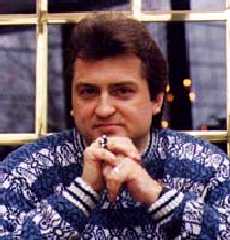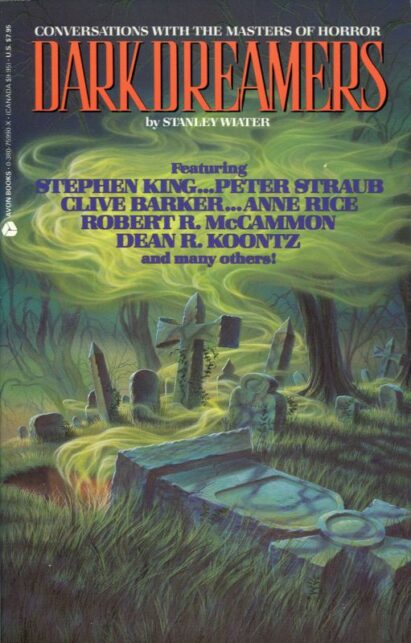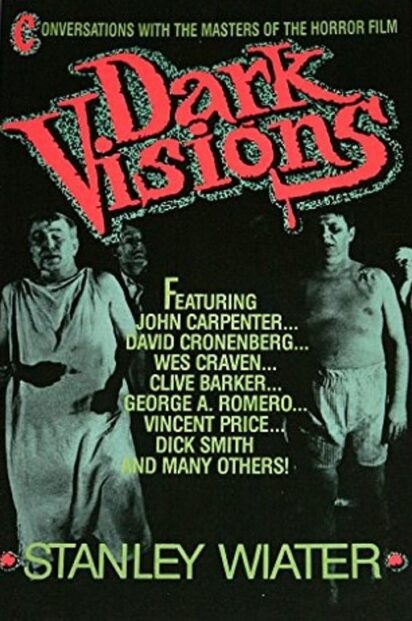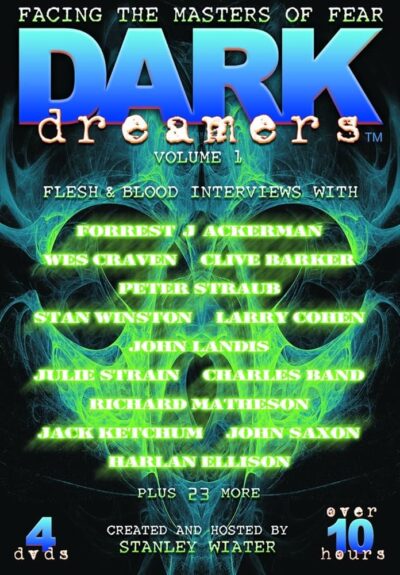 I’m not sure how the veteran writer-interviewer Stanley Wiater managed to convince a Canadian TV channel to broadcast a show comprised entirely of interviews with horror writers and filmmakers—and keep that show going for two seasons—but I’m glad he did. Broadcast in 2000-01 (not exactly a boom time for the genre) and collected on DVD in 2011, DARK DREAMERS has its annoyances but stands as a vital resource for horror fans, especially given that quite a few of its interviewees are now deceased (among them Richard Laymon, whose only extant on camera interview is contained herein, and George Clayton Johnson, whose appearance in the flesh is every bit as wild as the renderings of him in the 2023 graphic novel GEORGE’S RUN).
I’m not sure how the veteran writer-interviewer Stanley Wiater managed to convince a Canadian TV channel to broadcast a show comprised entirely of interviews with horror writers and filmmakers—and keep that show going for two seasons—but I’m glad he did. Broadcast in 2000-01 (not exactly a boom time for the genre) and collected on DVD in 2011, DARK DREAMERS has its annoyances but stands as a vital resource for horror fans, especially given that quite a few of its interviewees are now deceased (among them Richard Laymon, whose only extant on camera interview is contained herein, and George Clayton Johnson, whose appearance in the flesh is every bit as wild as the renderings of him in the 2023 graphic novel GEORGE’S RUN).
Stanley Wiater (pronounced We-otter) is, quite simply, the top interviewer in the horror field. Of his credentials I’ll let the man himself fill us in: “there are several brand name writers whom I’ve interviewed more times than any other journalist, in or out of the field.” A selection of those interviews (all previously published elsewhere) appeared in the 1990 volume DARK DREAMERS: CONVERSATIONS WITH THE MASTERS OF HORROR (Dark Dreamers being Wiater’s preferred term because “the epithet horror writer is too limiting”). Those “Masters” were novelists—Stephen King, Clive Barker, Anne Rice, Dean Koontz, etc.—and the book an excellent showcase for Wiater’s talents. It was followed in 1992 by the similarly  formatted DARK VISIONS, consisting of interviews with horror filmmakers like John Carpenter, David Cronenberg, Wes Craven, George Romero, etc. Novelists and filmmakers are combined in the DARK DREAMERS series, which appeared eight years later.
formatted DARK VISIONS, consisting of interviews with horror filmmakers like John Carpenter, David Cronenberg, Wes Craven, George Romero, etc. Novelists and filmmakers are combined in the DARK DREAMERS series, which appeared eight years later.
Wiater’s approach to interviewing, on display in DARK DREAMERS, DARK VISIONS and the DARK DREAMERS series, is as follows: “I try to meet at persons’ homes whenever possible, to make them feel most comfortable.” To that end we’re shown the interiors of Forrest J. Ackerman’s fabled “Ackermansion,” Bob Burns’ mini-museum home (containing quite a few iconic movie props), Clive Barker’s expansive art studio and Harlan Ellison’s “Ellison Wonderland” residence. Other interviews take place in Burbank’s Dark Delicacies bookstore and the participants’ offices, which isn’t always a wise move, as the lighting in these spaces tends to be quite harsh and unflattering on the faces of individuals who for the most part aren’t anyone’s idea of movie-star attractive.
An even greater problem is the presence of Wiater himself, who in addition to interviewing his subjects insists on providing on-camera intros (“Are you a dark dreamer? So-and-So certainly is”) and outros (“Join me here again on the wild side of the imagination”) to each episode. Rod Serling he isn’t, coming off as extremely stiff and affected, and so a far cry from the friendly demeanor Wiater uses (it’s been claimed) to get his subjects to drop their guard.
Thankfully the interviewees are much livelier. Clive Barker, whose profile kicked off the series, is his usual irrepressible, media-savvy self, while Harlan Ellison offers a typically confrontational appearance that’s closer to an extended monologue than a proper interview, much of it addressed directly at the camera. The B-movie actress Julie Strain, whose personal appearances can always be counted on to outdo her films in entertainment value, also proves quite an attention-grabber, admitting she “can’t act” and that her films have societal value due to the fact that they generally tend to screen late at night, and so as prospective filmmakers “drift off to sleep, I’m giving them the visions for their fantasies and their creativity.”
series, is his usual irrepressible, media-savvy self, while Harlan Ellison offers a typically confrontational appearance that’s closer to an extended monologue than a proper interview, much of it addressed directly at the camera. The B-movie actress Julie Strain, whose personal appearances can always be counted on to outdo her films in entertainment value, also proves quite an attention-grabber, admitting she “can’t act” and that her films have societal value due to the fact that they generally tend to screen late at night, and so as prospective filmmakers “drift off to sleep, I’m giving them the visions for their fantasies and their creativity.”
Speaking of interesting quotes, quite a few meme-worthy pronouncements are aired on this program, such as Richard Laymon’s claim that “Horror writers are specialists in the worst case scenario” and Wes Craven’s defense of spooky cinema as “An inoculation against true horror.” There’s also Chas. Balun’s unforgettable redefinition of truth-teller as “a voice out there that smells the fart in the elevator.”
This brings up Wiater’s ability to bring out the absolute best in his subjects. Charles Band, who generally comes off as an overgrown teenager, actually seems quite reasonable in his profile here. Ditto the notorious splatterpunk icon John Skipp, who proves himself quite an engaging and articulate speaker, and filmmaker Larry Cohen, who handily engages our attention despite assuming an awkward pose (and having the boom mike frequently dip into the frame throughout his interview).
The downside of Wiater’s approach are the unflattering revelations and “should they really have said that?” statements that inevitably emerge. In the former category is a comment by the late Peter Straub, who in enumerating his darkest fears reveals his privileged status by mentioning the unspeakable possibility that his kids might have to go to public school (horrors!), while PSYCHO screenwriter Joseph Stefano takes far too much credit for his  contributions to that script, which was in fact a fairly straight adaptation of the source novel by Robert Bloch. In the latter category are Richard Christian Matheson’s admission that his father, the legendary Richard Matheson (who’s also interviewed), paid him to write in his early years (thus justifying Julie Strain’s comment that “If you’re gonna end up in Hollywood, hopefully you’ll have rich parents”), and Harlan Ellison imploring “Don’t go into the grave with that story unfinished!,” which given the innumerable stories and novels Ellison left incomplete at the time of his 2018 death can be deemed the ultimate self-own.
contributions to that script, which was in fact a fairly straight adaptation of the source novel by Robert Bloch. In the latter category are Richard Christian Matheson’s admission that his father, the legendary Richard Matheson (who’s also interviewed), paid him to write in his early years (thus justifying Julie Strain’s comment that “If you’re gonna end up in Hollywood, hopefully you’ll have rich parents”), and Harlan Ellison imploring “Don’t go into the grave with that story unfinished!,” which given the innumerable stories and novels Ellison left incomplete at the time of his 2018 death can be deemed the ultimate self-own.
Discouraging prospective writers proves quite popular. Gahan Wilson boasts that “I try and discourage (beginning writers)” because “if I can discourage them they have no business doing it,” while the Canadian novelist Edo van Belkom (Wiater evidently took special care to include as many Canadians as he possibly could) states that “I wouldn’t want to inspire anyone to become a writer because I wouldn’t wish this on anyone.”
Further nuggets are provided by John Landis, who directed the Michael Jackson THRILLER video, and says he doesn’t believe the pedophilia allegations made against Jackson, although Landis concedes that “he’s a strange fellow, no doubt.” There’s also Mr. Craven, who spends his entire interview discussing the link between reel and real violence (presumably because, as the interview makes clear, 9-11 had just occurred), and Stan Winston plugging his toy line at some length.
Some important voices are missing. Anne Rice, Dean Koontz, John Carpenter and George Romero aren’t found here, and nor is the individual pictured most prominently in the opening photo montage, and referenced more than any other (being the major subject of artist Bernie Wrightson’s interview): Stephen King. This doesn’t render DARK DREAMERS useless by any means, but King’s absence does leave something of a gaping hole in an overview that’s otherwise quite thorough.
